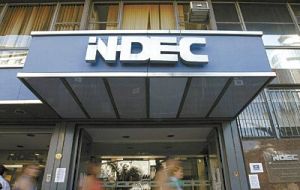MercoPress. South Atlantic News Agency
Argentina’s Congress ‘inflation index’ for July, 1.62%, doubles the official rate
 Indec inflation indexes are two and three times lower than provincial estimates
Indec inflation indexes are two and three times lower than provincial estimates Argentina’s “Congress inflation index” reached 1.62% in July, confirming well over 23% for the last twelve months according to the latest release from the Lower House.
The Congress index is an average of private consultants that have been scared from publicly exposing their estimates by the government of Cristina Fernandez de Kirchner and her Domestic Market Secretary Guillermo Moreno who has imposed heavy fines on those who do not abide by an arbitrary decree on the matter.
Opposition members of Congress regularly make an average index release.
The 1.62% represents an increase over the 1.5% for June and accumulates above the 23.5% of the previous twelve months to June.
However the official July inflation rate from the government’s controversial statistics office, Indec is expected to stand at 0.7%, nevertheless reflecting a strong impact of rises in food and beverage prices.
According to Economia & Regiones, vegetable prices were up 22.7% and flour and bread products, 8.2%
“Price caps on flour are not slowing down rising prices on bread because energy, labour and marketing costs are tracking inflation and rising faster than flour prices” Economia & Regiones said.
Analysts and politicians accuse the government of down-playing inflation for political gain and to save on inflation-linked debt payments.
Indec reported 12-month inflation through June at 9.7%, unchanged from May.
Latin America's No. 3 economy is growing at one of the region's fastest rates on the back of high global commodity prices and solid industrial output and consumer spending.
But economists warn high inflation is becoming entrenched, fuelling wage demands as it erodes purchasing power and the competitive advantage that a weak Peso gives to exporters.
Some Argentine provinces which still have their own autonomous statistics offices report consumer inflation percentages considerably higher than the official Indec index.
For example the province of Mendoza in June reported inflation was 1.4% accumulating in the first half of 2011, an increase of 10.9% and 21.1% during the last twelve months.
In Ushuaia, Tierra del Fuego, extreme south of the country, and exposed to higher indexes because of its remoteness, in June inflation prices were up 3.24% and in Rio Grande, 2.32%.
In Tierra del Fuego inflation in the first half of the year was 18% and in the last twelve months, 29.8%.
The official Indec percentage for June was 0.7%; in the first six months of the year 4.7% and 9.7% in the last twelve months.




Top Comments
Disclaimer & comment rulesCommenting for this story is now closed.
If you have a Facebook account, become a fan and comment on our Facebook Page!